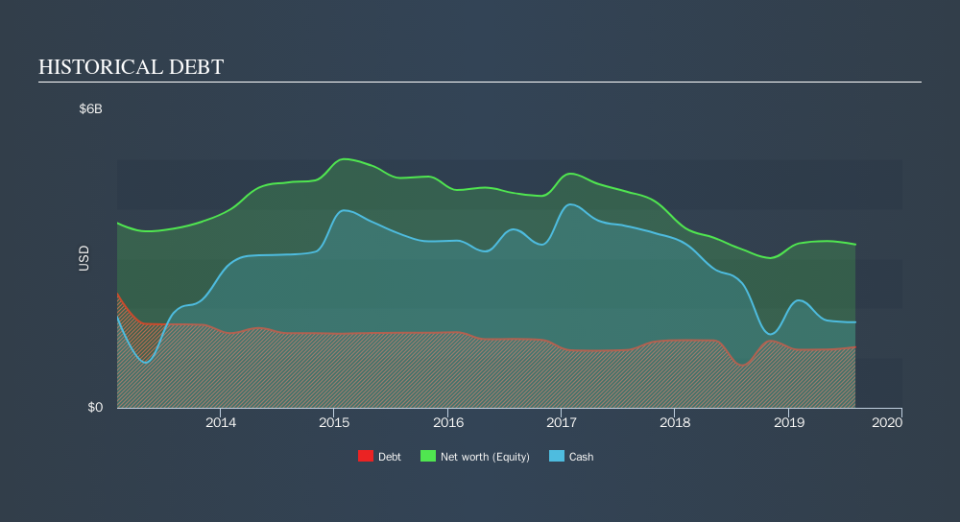We Think Best Buy (NYSE:BBY) Can Stay On Top Of Its Debt

Warren Buffett famously said, 'Volatility is far from synonymous with risk.' It's only natural to consider a company's balance sheet when you examine how risky it is, since debt is often involved when a business collapses. Importantly, Best Buy Co., Inc. (NYSE:BBY) does carry debt. But should shareholders be worried about its use of debt?
Why Does Debt Bring Risk?
Generally speaking, debt only becomes a real problem when a company can't easily pay it off, either by raising capital or with its own cash flow. Part and parcel of capitalism is the process of 'creative destruction' where failed businesses are mercilessly liquidated by their bankers. However, a more common (but still painful) scenario is that it has to raise new equity capital at a low price, thus permanently diluting shareholders. Of course, plenty of companies use debt to fund growth, without any negative consequences. When we examine debt levels, we first consider both cash and debt levels, together.
Check out our latest analysis for Best Buy
How Much Debt Does Best Buy Carry?
You can click the graphic below for the historical numbers, but it shows that as of August 2019 Best Buy had US$1.22b of debt, an increase on US$855.0m, over one year. But on the other hand it also has US$1.72b in cash, leading to a US$499.0m net cash position.
A Look At Best Buy's Liabilities
We can see from the most recent balance sheet that Best Buy had liabilities of US$7.58b falling due within a year, and liabilities of US$4.12b due beyond that. Offsetting this, it had US$1.72b in cash and US$966.0m in receivables that were due within 12 months. So its liabilities outweigh the sum of its cash and (near-term) receivables by US$9.01b.
While this might seem like a lot, it is not so bad since Best Buy has a huge market capitalization of US$19.8b, and so it could probably strengthen its balance sheet by raising capital if it needed to. However, it is still worthwhile taking a close look at its ability to pay off debt. While it does have liabilities worth noting, Best Buy also has more cash than debt, so we're pretty confident it can manage its debt safely.
Fortunately, Best Buy grew its EBIT by 2.2% in the last year, making that debt load look even more manageable. There's no doubt that we learn most about debt from the balance sheet. But it is future earnings, more than anything, that will determine Best Buy's ability to maintain a healthy balance sheet going forward. So if you want to see what the professionals think, you might find this free report on analyst profit forecasts to be interesting.
Finally, a business needs free cash flow to pay off debt; accounting profits just don't cut it. Best Buy may have net cash on the balance sheet, but it is still interesting to look at how well the business converts its earnings before interest and tax (EBIT) to free cash flow, because that will influence both its need for, and its capacity to manage debt. During the last three years, Best Buy produced sturdy free cash flow equating to 72% of its EBIT, about what we'd expect. This free cash flow puts the company in a good position to pay down debt, when appropriate.
Summing up
Although Best Buy's balance sheet isn't particularly strong, due to the total liabilities, it is clearly positive to see that it has net cash of US$499.0m. The cherry on top was that in converted 72% of that EBIT to free cash flow, bringing in US$1.1b. So we don't have any problem with Best Buy's use of debt. Of course, we wouldn't say no to the extra confidence that we'd gain if we knew that Best Buy insiders have been buying shares: if you're on the same wavelength, you can find out if insiders are buying by clicking this link.
Of course, if you're the type of investor who prefers buying stocks without the burden of debt, then don't hesitate to discover our exclusive list of net cash growth stocks, today.
We aim to bring you long-term focused research analysis driven by fundamental data. Note that our analysis may not factor in the latest price-sensitive company announcements or qualitative material.
If you spot an error that warrants correction, please contact the editor at editorial-team@simplywallst.com. This article by Simply Wall St is general in nature. It does not constitute a recommendation to buy or sell any stock, and does not take account of your objectives, or your financial situation. Simply Wall St has no position in the stocks mentioned. Thank you for reading.

 Yahoo Finance
Yahoo Finance 
